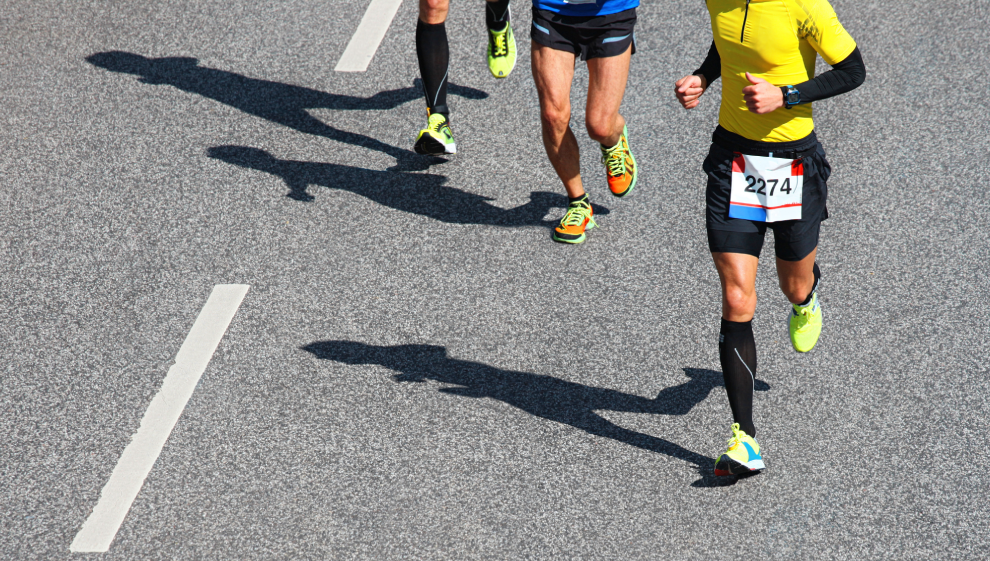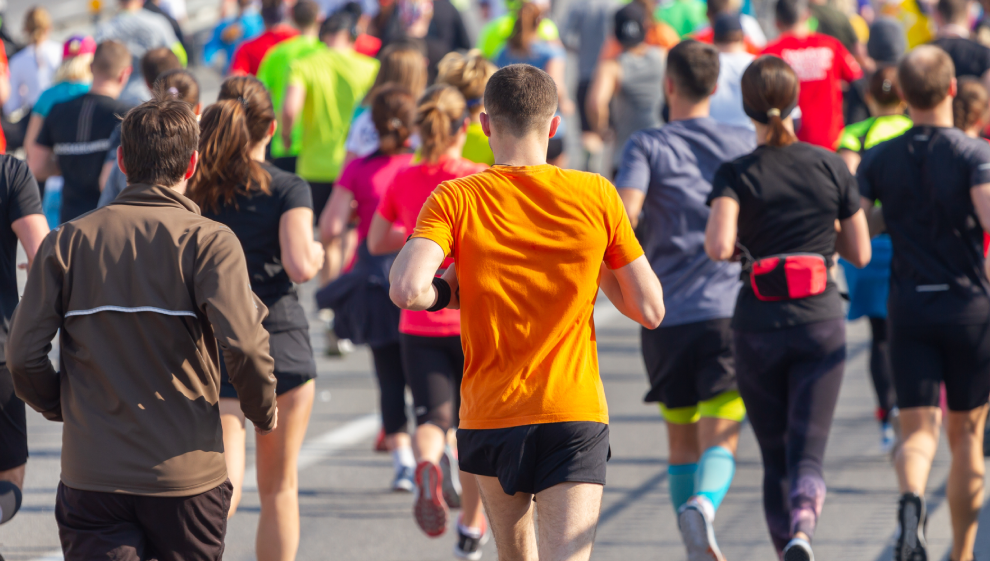What to expect the day of your first marathon
- Overview
- Key takeaways
- Go over your race day plan
- The night before
- What and when to eat
- Run through your list of essentials
- Arrive with plenty of time to spare
- Familiarise yourself with the toilet situation
- Remember your pacing strategy
- Fuel yourself carefully
- Mentally prepare yourself for the race
- Enjoy it out there
Processing your emotions, knowing what to eat beforehand, and getting to the start line on time can all have a big impact on a marathon. The trick is to plan everything well in advance to avoid any stress or concerns that may lessen your enjoyment of the day.
Key takeaways
- Check all your gear and tech is charged and working the night before
- Have everything you’ll need in one place before going to bed
- Nothing new on race day
- Eat a light and filling breakfast around three hours before the race
- Always check the weather forecast and dress accordingly
- Layer up to avoid getting cold at the start line (you can toss an old jumper if necessary)
- Stick to your pace and don’t let excitement affect your plan
Go over your race day plan
How your race works will largely depend on the organiser and the size of the race.
It’s important you keep up with all the emails or letters you get about your race. These will contain all the information you need to get you across the start line on race day.
It’s also worth following the organisers of the race on social media to be notified of any unexpected issues like weather or timing changes.
Picking up your number

Make sure you know when and where to collect your race number from. This number serves as your identification for the race.
Small events typically involve you picking your number up on the day from a tent or booth on site. Some of these may require identification or a booking reference number.
Most large-scale marathons operate an expo leading up to race day which you’ll need to visit in order to collect your race pack. The location of these can vary depending on the marathon, so it’s worth planning how to get there well in advance.
A good tip is to check reviews or forums to find out when these are at their busiest. Saturdays are usually the worst day to go, so aim to get there before then. Make sure you take an ID with you and your booking confirmation email if required.
Your bag drop location
This will either be communicated to you prior to the race or made obvious at the briefing in the start area on race day.
For marathons that start and end in a different location, transport is required to shuttle belongings between locations. This might mean there are multiple different bag-drop areas.
If you’re bringing a bag, make sure you know where you’re going to store it. Don’t leave valuables in your bag as it’s likely that any loss or damage of these items won’t be covered by the race organisers.
Your start location
This sounds obvious, but not all events are signposted equally.
Have a good look at the course and start zone map once you’re inside to make sure you know when and where you’re going when your wave is called.
Some of the major marathons have different start areas to funnel runners onto the main course. Marathon events are strict about this, so make sure you know yours. If you attempt to enter the wrong starter pen it’s likely you’ll be turned away and have to find the correct one that matches your bib.
Your wave time
Wave times are used to stagger the start of busy races. Without them, thousands of runners would all start together and cause congestion.
You might know your wave before the race or it will be communicated to you in the start area. These are sometimes subject to change, so take your earphones out and keep an eye on yours.
Your start time
Lastly, the final piece of your preparation puzzle.
Your start time indicates when your wave will cross the start line. Commit your start time to memory and leave with enough time to allow for any delays or interruptions to your journey. Most races will let you join a later start wave, but you won’t be able to join an earlier one.
Wave times are usually based on the predicted time you submit when you register for the race. It’s important to start in the right wave as this can have a big impact on how the next 26.2 miles go. Start in a wave that’s too fast and you’ll be flanked by people trying to get past you for the first few kilometres. Start in one that’s too slow, and you may struggle to run at the pace you want.
The night before
As you’ll know from your training, preparation is key. The evening before your race is all about ticking off your checklist so you don’t forget anything in the morning.
- Eat a dinner that prioritises healthy carbohydrate and proteins
- Rest
- Have a warm bath or shower
- Get your trainers and kit ready
- Pack your bag
- Distract yourself with a TV show or film
- Take a light walk to keep busy
- Avoid alcohol or too much caffeine
What and when to eat
Your pre-race meal is all about fuelling for your race. Eat too little and you’re going to lack the fuel to push your muscles the distance. Eat too much and you risk feeling sluggish and heavy at the start line.
Everybody is different, but research indicates the rough sweet spot for eating a meal before exercise is around three to four hours before your race. If you’re only snacking or eating something light, you can move this window forward and eat around one to two hours before your race.
Regardless of the size of your meal, always avoid overeating before a race. The best way to find out what works for you is to use a trial-and-error approach during your training. Use your training block to experiment and find out how different foods affect you over different distances.
For your first marathon, consider waking up two to three hours before your race and eating something like peanut butter on toast with an energy bar. If you’re after something even lighter, opt for half a bagel and a banana.
Run through your list of essentials
Every runner has their race day essentials. If you’re worried you’ve forgotten something, use our checklist below to jog your memory:
- Running shoes
- Race number
- Your phone
- Smart watch
- Energy gels
- Energy bars
- Water and energy drinks
- Suncream
- ID
- Anti-chafe cream
- Drop bag (if necessary)
Arrive with plenty of time to spare
This might not apply to seasoned veteran runners, but you don’t want your first marathon ruined by traffic or public transport cancellations.
Make sure you know exactly where you’re going to park or what your public transport journey to the start line looks like and always have a backup plan if something goes wrong.
Major marathons like London and Boston can be trickier to get to because of road closures and congestion, so leave your house with plenty of time to spare.
We recommend arriving at the start area at least an hour before your wave is due to leave. Always consult your race organiser for information on this, as different races will have different rules about when and where you should arrive before you start.
Familiarise yourself with the toilet situation
If there’s one thing that affects your enjoyment of a marathon, it’s the toilets.
All marathons will provide access to toilets at the start of a race, but due to the number of people taking part at large-scale events, expect big queues. At some of the biggest races these can last up to an hour.
A good strategy is to get up early on race day to allow plenty of time for using the toilet. It’s also advisable to do some research into possible toilet stops on route to the start line that you can use instead of queuing up at the race itself.
Finally, grab some toilet roll to put in your bag before getting to the race start. Because of the big queues it tends to run out quickly.
Remember your pacing strategy
Pacing is arguably the most important aspect of any race.
Stick to the pace you’ve trained for and don’t speed up. If you need to slow down, remember that it’s your first race and that you’re not running to win.
Have fun with it, and if you feel the need to slow down, don’t beat yourself up. Your first marathon is all about getting across the finish line comfortably whilst enjoying the experience.
- Looking for a new training plan? Click here to see our 16-week marathon plan
Fuel yourself carefully
Remember, nothing new on race day.
This is especially important when it comes to hydration and nutrition. You don’t want stomach trouble ruining or cutting your marathon experience short.
Only take gels, sweets, and other energy sources that you’ve eaten before with you. Avoid energy drinks that you haven’t had before and make sure you’re comfortable with the amount of fuel you’re carrying with you.
All marathons will have aid stations dotted about on the course, but you can’t guarantee they’ll have what you want or need if your race isn’t going to plan.
It’s completely normal to feel tired during a marathon and by the last few miles it’s likely that your legs will be aching. It can be tempting to pick up any fuel or nutrition on the course hoping that it will give you energy. Be conservative though and stick to your plan – many first-time marathons have been ruined by urgent stops for the toilet every few kms.
Mentally prepare yourself for the race

Trust your training and don’t get caught up thinking about how long you’ve got left.
If your goal is to finish the race, try chunking the race into smaller distances. For some people, eight and a bit parkruns sounds a lot easier than 26.2 miles.
If your goal is to hit a target pace, monitor your pace every few kilometres and make sure you aren’t speeding up too much. It’s easy to get carried away on race day.
Try not to focus too heavily on meeting a certain pace. Your first marathon should be all about finishing the race and having a good time along the way.
When the going gets tough…
Mixing it up a bit can really help if you’re struggling. Listening to music, putting a podcast on, or doing the opposite and taking your headphones off can all make a difference during tough stretches.
Just make sure you check the rules set for headphone usage at your marathon. Although rare, some races don’t allow headphones for safety reasons.
Try to remember why you’re running your marathon and how far you’ve come. Picturing your family at the finish line or remembering the great charity work you’re helping to fund can be a real morale booster during tough sections of the race.
Enjoy it out there
The most important thing is that you enjoy yourself out there.
Running a marathon isn’t easy, so soak up the atmosphere and enjoy the journey. Have a great time and remember, you’re about to achieve something that few people will ever do. It’s estimated that only 0.01% of people globally will run a marathon.
- Interested in another one? Click here for a list of our favourite UK marathons
Last updated Tuesday 15 October 2024
First published on Tuesday 15 October 2024
